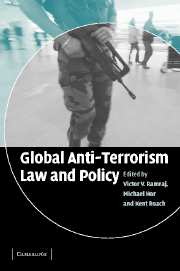Book contents
- Frontmatter
- Contents
- List of contributors
- Acknowledgements
- 1 Introduction
- PART ONE Theoretical Perspectives on Anti-Terrorism Law and Policy
- PART TWO A Comparative Study of Anti-Terrorism Measures
- PART THREE Anti-Terrorism Law and Policy in Asia
- PART FOUR Regional Cooperation
- PART FIVE Anti-Terrorism Law and Policy in the West
- PART SIX Anti-Terrorism Measures in Africa, the Middle East and Argentina
- 25 Terrorism and governance in South Africa and Eastern Africa
- 26 Rocks, hard places and human rights: anti-terrorism law and policy in Arab states
- 27 Terrorism in Argentina: government as its own worst enemy
- 28 Postscript: Some recent developments
- Index
28 - Postscript: Some recent developments
Published online by Cambridge University Press: 21 July 2009
- Frontmatter
- Contents
- List of contributors
- Acknowledgements
- 1 Introduction
- PART ONE Theoretical Perspectives on Anti-Terrorism Law and Policy
- PART TWO A Comparative Study of Anti-Terrorism Measures
- PART THREE Anti-Terrorism Law and Policy in Asia
- PART FOUR Regional Cooperation
- PART FIVE Anti-Terrorism Law and Policy in the West
- PART SIX Anti-Terrorism Measures in Africa, the Middle East and Argentina
- 25 Terrorism and governance in South Africa and Eastern Africa
- 26 Rocks, hard places and human rights: anti-terrorism law and policy in Arab states
- 27 Terrorism in Argentina: government as its own worst enemy
- 28 Postscript: Some recent developments
- Index
Summary
Anti-terrorism law and policy is a rapidly evolving field, and since the chapters in this book were last revised, between September and November 2004, there have been numerous developments in the various jurisdictions and areas of law covered in this book. We could not, in the late stages of production, provide a comprehensive update of all of these developments, but some of them were sufficiently important and relevant to the chapters in this book as to warrant a brief mention in a postscript.
United Kingdom: the House of Lords rules on indefinite detention of non-nationals
On 16 December 2004, the House of Lords released its landmark decision in A. v. Secretary of State for the Home Department. The question in this case was whether the provisions in Part 4 of the Anti-terrorism, Crime and Security Act 2001 (ATCSA), which effectively permitted the indefinite detention of non-nationals of the United Kingdom who were suspected of being involved with international terrorism but who could not be deported, since they might be tortured in the receiving country, were inconsistent with the UK's obligations under the European Convention on Human Rights. The UK had formally derogated from Article 5(1)(f) of the Convention, which permitted the detention of foreign citizens only when ‘action is being taken with a view to deportation’.
- Type
- Chapter
- Information
- Global Anti-Terrorism Law and Policy , pp. 625 - 634Publisher: Cambridge University PressPrint publication year: 2005



